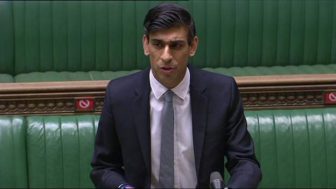The chancellor’s decision to extend the stamp duty holiday beyond the end of this month has been welcomed by most homebuyers and estate agents.

A phased end to the stamp duty holiday will turn “generation rent” into “generation buy”, Rishi Sunak claimed yesterday.
He acknowledged that many purchases would not complete before the original deadline of 31 March due to delays in the homebuying process.
Responding to calls from the industry for a tapered extension to prevent buyers facing unexpected bills, he said that the threshold for the tax to start would remain at £500,000 in England and Northern Ireland until 30 June.
After that, it will be reduced to £250,000 until 30 September, before returning to its original level of £125,000.
Mark Hayward, chief policy adviser at Propertymark, was among those that welcomed the change and called on Scotland and Wales to follow suit.
He said: “The extension of the stamp duty holiday to the end of June followed by the transition to the end of September is much needed to help prevent sales falling through as the initial deadline approaches.
“We urge the governments in Scotland and Wales to follow the UK government’s lead on this.”
Yesterday’s stamp duty extension is not just welcome news for thousands of homebuyers-in-waiting and agents, but also provides “a tonic” for thousands of conveyancers, according to Andy Sommerville, director of Search Acumen.
“Conveyancers have been under pressure to complete due diligence on an industrial scale against a pressing deadline, and risking burnout at a time when businesses are still under government instructions to work from home,” he said.
But he also warns that extending the stamp duty deadline is delaying the inevitable cliff edge.
He continued: “The chancellor’s much-anticipated move simply defers rather than dodges the cliff-edge by putting it off until June.
“The stamp duty holiday has once again shown the flaws in traditional working practices and flagged the need to future-proof the property market with a data-driven approach to drive transactions through to completion.
“Given the technology at our fingertips, no homebuyer in 2021 should have to wait for weeks at the back of a queue for due diligence to be completed. Neither should any conveyancer have to apologise to their clients for delays caused by a system clearly past its sell-by date.”
While it is positive to see the government listen to the views of agents and conveyancers on the coalface, as well as the property-buying public, more consideration should have been paid to calls for a more specific tapered end to the tax cut, according to Bryan Mansell, co-founder at Gazeal.
Mansell commented: “A three-month extension – and additional help until September – will be more effective than an additional six weeks, which was previously rumoured to be in the chancellor’s plans. However, it still creates a cliff-edge so even though more buyers will benefit from stamp duty savings than previously thought, there will still be some who miss out.”
He added: “As accentuated by the stamp duty holiday rush, the current homemoving process is broken and struggles to cope with a high number of transactions.”
Milan Pandya, partner, Blick Rothenberg, concurred: “The chancellor has yet again set a date-based cliff edge of 30 September.”
While the stamp duty holiday extension gives current buyers more time to benefit from the tax relief, Miles Robinson, head of mortgages at online mortgage broker Trussle, is urging the government to consider adopting a more tapered ending to the scheme from September.
“This would guarantee the stamp duty holiday to buyers who have received a mortgage offer before a certain date,” he said. “Not only would this prevent a shock to the market, it would also shield buyers from the damaging costs of a collapsed purchase. A late stage collapse costs on average £5,439.80 in estate agent fees, valuations, surveys and legal costs.”
Matthew Pratt, Redrow’s Group CEO, would like to see in the medium-term – beyond October – wholesale reform of this tax.
“Stamp duty outside of the current holiday is a barrier to people moving home, and it shouldn’t be,” he said.
“Historically stamp duty was not a significant contributor to Treasury coffers, but it became more onerous from the mid-1990s onwards, and a 10% and 12% band was introduced for higher value homes in 2014,” he added. “Stamp duty is also inconsistent with other property taxes and schemes, particularly when it comes to the new Help to Buy regional caps, and the upper threshold value of properties under the new mortgage guarantee scheme. Simplicity is to be strived for.”
Pratt continued: “We would encourage government to consider permanently reducing the current stamp duty tax bands across all levels, including the higher bands, and we believe the abrupt leap from the 5% to 10% tax band is particularly prohibitive.
“A lower, flat rate of tax across homes of all value would be much simpler and far less restrictive. It is right that first-time buyers get more support than others on paying stamp duty through any new regime as they don’t currently have any equity built up.”
Andrew White, head of residential at Colliers, believes that it is good that there will be a staged return to the normal level in October. But ultimately he thinks the levy should be scrapped in its existing form.
“It’s disappointing that the duty is in place at all. It would have been better if it was scrapped for properties worth under £500,000 permanently and a higher tax was instead applied to super prime properties.
“One of the unintended consequences of the stamp duty holiday has been it has unlocked more buy-to-let purchases, which had been dampened by the previous three per cent levy added on to the tax. While this pushes up house prices, and reduces their affordability, it also provides the government with further tax opportunities.”




I cannot be the only one wondering when a story regarding furlough will appear.
How many firms operating near the housing market have claims in?
How many are doing so fraudulently?
I’ve already heard whispers that there are firms claiming and still working.
I highlight it here because HMG / HMRC will have clear data that we’re in the busiest moving market ever.
How many will be caught with their fingers in the till as well as their pants down when this shakes out?
You must be logged in to like or dislike this comments.
Click to login
Don't have an account? Click here to register
Too right. It’s only a matter of time as most people in this country are decent and respectable and they find the misuse of furlough, grants or loans as utterly abhorrent.
The pigeons always come home to roost.
You must be logged in to like or dislike this comments.
Click to login
Don't have an account? Click here to register
I know there is one firm of Solicitors in our area who would probably have questions to answer if the furlough situation was raised with them.
You must be logged in to like or dislike this comments.
Click to login
Don't have an account? Click here to register
The recovery of fraudulent furlough payment income will be huge, you watch. The government needs every penny back, and the fallout for businesses and individuals will be a sight to behold, while the rest of us got on and were honest and kept the economy trading.
You must be logged in to like or dislike this comments.
Click to login
Don't have an account? Click here to register
It should go back to pre Gordon Brown levels of 1% across the board.
You must be logged in to like or dislike this comments.
Click to login
Don't have an account? Click here to register